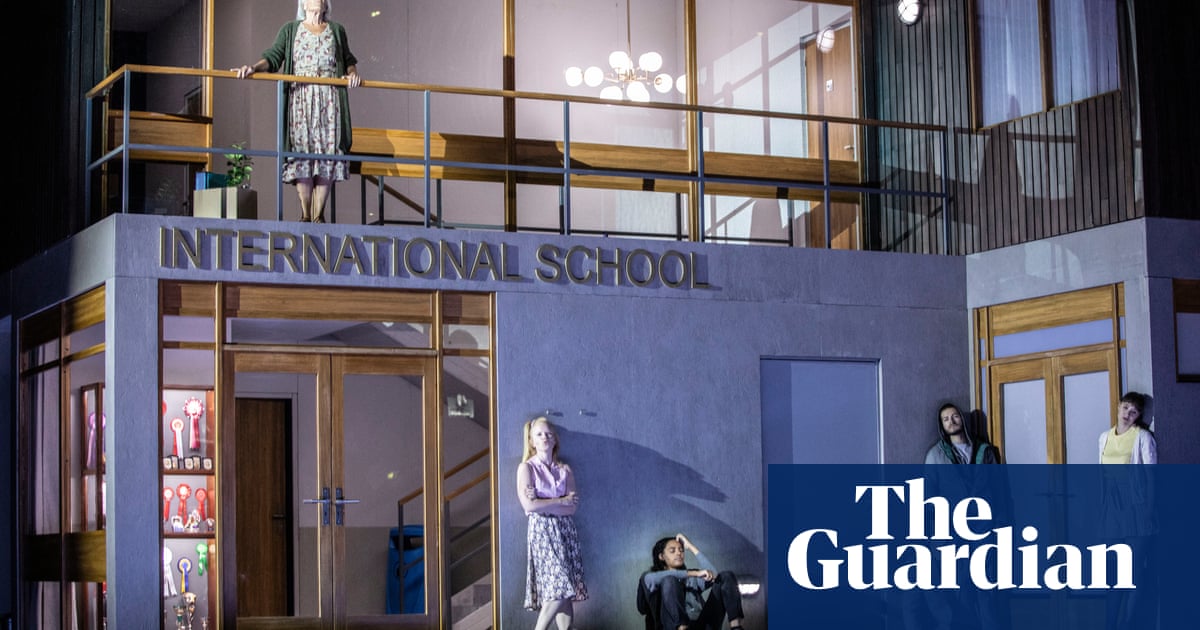
Jordanian actress and writer Tima Shomali said: ‘We’re truly bringing our voice to the world’
DUBAI: Tima Shomali has spent the last 10 years chronicling the perspective of contemporary Arab women, using humor to talk about issues that women face in the Middle East. Now, on the grandest stage of all, the Jordanian actress and writer is bringing audiences into the world of teenage girls in the region, with as cutting and honest a portrayal as we’ve ever seen.
For the latest updates, follow us on Instagram @arabnews.lifestyle
The show is “AlRawabi School for Girls,” the second Netflix original Arabic series, and with it, Shomali not only puts a spotlight on parts of the lives of young women that have previously been kept in the dark, but also proves that once that light shines, each of those issues is more universal than you may expect.
“It was important for me to tell the story of these young girls, because I felt that we haven’t seen it in depth,” Shomali tells Arab News. “This age group has so many stories, and their secrets, their insecurities, their relationships, their loves, has been always a mystery. I wanted to give a small glimpse into social issues such as cyberbullying, the gap between the families and their daughters, and the gap in social conversation more broadly.”
“AlRawabi School for Girls” begins streaming on August 12. (Supplied)
“AlRawabi School for Girls,” which begins streaming on August 12, tells the story of a group of girls who are bullied by their school’s equivalent of Regina George from “Mean Girls.” Instead of just accepting their fate, they decide to hatch a plot of revenge, told with both light wit and dramatic heft.
In addition to the show’s young cast — headlined by Andria Tayeh, Noor Taher, Joanna Arida and Yara Mustafa — Shomali’s ride-or-die collaborator and close friend Rakeen Saad, who stars as Noaf, is also along for the journey.
For Saad, who previously starred in Shomali’s TV series and YouTube viral hit “FemaleShow” from 2013 to 2016, what made the show unique was not just its attempt to get into the minds of young Arab women, but to do it with mostly women behind the camera.
“AlRawabi School for Girls” is the second Netflix original Arabic series. (Supplied)
“No matter where you’re from, we are all humans and we go through more or less the same struggles. The picture from the outside might be different, the circumstances we live in might be different, but in the end, in our hearts, we’re all saying the same things,” says Saad.
“The struggles of the characters, and their mental health journey, are so powerful. It’s a really nice show, because for me as an actor, the women characters in the show are written by a woman, and the crew was mostly women. We’re truly bringing our voice to the world.”
For Shomali, that was no accident. The show needed to avoid the male perspective on womanhood to ring true.
Shomali not only puts a spotlight on parts of the lives of young women that have previously been kept in the dark, but also proves that once that light shines, each of those issues is more universal than you may expect. (Supplied)
“Usually, female characters are portrayed from the perspective of how a man sees these women. The difference in this show is that it’s written by a woman, from the eyes of woman, telling stories of young women. And in each department — from cinematography to production design, from character to costumes — each one of these women (brought) her own touch to it, to tell the story of these young women,” says Shomali.
Such attention to detail is a signature of Shomali’s work and — along with her sharp focus on collaboration — is something that has always impressed Saad about her close friend.
“What I love about Tima is that she’s so into details. When we speak about the character, the background, we sit and we do a lot of rehearsals, and then I come up with my ideas. And then she comes up with a really good idea, whether it’s about the character or the look,” says Saad.
Shomali has established herself as a regional voice speaking to young women directly, working to empower them even in the most uncomfortable situations.
The Jordanian actress and writer is bringing audiences into the world of teenage girls in the region, with as cutting and honest a portrayal as we’ve ever seen. (Supplied)
“My purpose is to help girls to stand up and talk, because (we) are taught to stay quiet… All I want is girls to stand up for themselves and talk, because if we keep ignoring things, they will keep happening,” Shomali said six years ago at the Women in the World Summit.
But the issues that the show explores are universal to women across the world. To Shomali, that was the most revealing part of her preparations to write the show.
“I sat with I don’t know how many girls from very different environments, very different cultures. Throughout this research, I noticed one thing: No matter where you are from, what your background is, the struggles are the same for the girls,” says Shomali.
That, she believes, is why the show is well-suited to Netflix and the 190 countries it reaches. It is set to premiere in 32 languages, and it is not just made for young women in the Arab world, it’s made so that a young woman on the other side of the planet might stumble upon it and realize she’s not alone, that a young woman in Amman is also trying to hatch a plan to get back at her online tormentors.
Shomali’s breakout success was 2011’s “Bath Bayakha.” (Supplied)
“My hope for this show to go from a local audience to an international audience, because really the struggle of the girls at these ages, no matter where we are from, are the same. Hopefully someone from Saudi Arabia or Jordan relates to one character, and another one from Brazil or the US relates to another character,” says Shomali.
Shomali’s breakout success was 2011’s “Bath Bayakha,” which used comedy to tackle social issues in the Arab world, with a particular focus on young women. Through her rise in shows such as “Nida’a Show,” “Zain” and “FemaleShow,” her signature work, she may not have spoken about it, but Shomali always quietly dreamed she’d be able to do a show like “AlRawabi School for Girls” — a premium series made for a global platform.
The show could change Shomali’s life forever, and she knows it, whether she’ll admit it or not.
“We’ve worked together on many projects, but this project was very different,” says Saad. “I know that this was a dream for her. And she was working so hard on it.”
In a candid moment with Arab News, Saad turns to Shomali and states how conscious she is of what this moment means for both her and her friend.
“I’m really very proud of you,” Saad says to Shomali. “That you finally did that. You’re such a hard worker. And you’ve worked so hard on your scripts, whether from before or now. And you want to do something different. And you’re so talented. You finally did it.”












